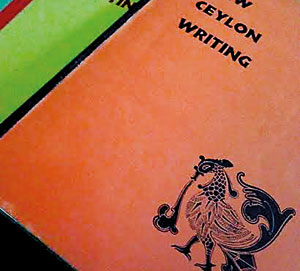New Ceylon Writing returns with promises of something different

Pic by Devika Brendon
The revival of New Ceylon Writing made for a welcome announcement last month, with the noted literary magazine sending out a call for submissions. NCW first published in 1970, enjoyed a 15-year run, during which it is said to have featured some of the best and most significant creative and critical writing in English to appear in post-Independence Sri Lanka. Even then the magazine was determinedly independent, seeking no sponsorship or support other than from those who read and contributed to it.
The noted writer Yasmine Gooneratne remembers well how the first edition was produced in 1970. At the time, Gooneratne herself had not seriously considered publication. “I had very recently begun writing poetry myself, impelled to do so by the death of my father in 1969,” she says.When the idea came up in a conversation between a group of junior academic staff in the Arts Faculty staff room of the University of Ceylon at Peradeniya, it seemed to her a very good one. Now they had to make do on a budget.
She remembers the process: “The text was typed on a portable Olympia typewriter, stencilled and cyclostyled on campus, and the magazine’s pages were collated in the homes of the editors. In designing a cover for that first issue we avoided boards in the ‘political’ colours of green, blue and red, and opted instead for a plain whiteboard, on which the lettering of the magazine title and our elegant ‘Hansa’ logo were arranged in black by a kindly printer, T.B.S. Godamunne & Sons at the Sithumina Press in Kandy.”
Speaking to the Sunday Times, Gooneratne says the magazine in 2016 will remain the same in most respects: “a non-political, non-profitmaking journal dedicated to the creative work of Sri Lanka’s writers in English that aims to practise and promote the highest artistic and ethical standards of literary expression.” As before, they will publish poetry, fiction, reviews and essays, as well as commentary on recent significant literary and cultural developments and notices of new and forthcoming books.
In other aspects however, the magazine will have moved on from 1985 – for starters, it will be available online. Instead of one or two members, the editorial board will now include six published and practising writers. “We have specifically included on our board bi-lingual writers with expertise in translation, to ensure that there is encouragement and equity for writers submitting their work in these languages,” says Gooneratne, adding that the decision to not award the Tamil prize in this year’s inaugural The Fairway National Literary Award is one prompt for the writing community to help aspiring novelists and poets improve the quality of their work, prior to submitting it for prizes such as this.
“Our writers are naïve, tolerant, diffident, and for those very reasons extremely vulnerable,” says Gooneratne, highlighting a range of issues from a need for authors to be more receptive to criticism, to the importance of improving their knowledge of the publishing world, fees and copyright issues. Gooneratne is unambiguous about the toothless reviews often carried in local papers, often penned by friends and colleagues of the author. “Such a review is worse than useless, neither author nor reader can gain anything of value from it,” she says categorically
Now, the NCW team know what they hope to see from new writers. “We’re hoping to encounter energy, quality, originality and wit.” Quoting a colleague who said, ‘War, disaster, crime, violence and corruption have become dominant themes in our literature nowadays: it’s a reflection of the reality we have experienced,’ Gooneratne adds: “We hope the revived NCW will reflect more varied and positive developments and contribute to these positive developments.”
Speaking of falling standards in the publishing industry, Gooneratne says that NCW will support a new generation of writers and poets by helping them discover and master their own unique voice. The team is aware of and determined to avoid becoming trapped in the familiar cycle of promoting the work of a small, closed group of writers and publishing self-congratulatory and ‘friendly’ reviews.
“New Ceylon Writing was formed by a generous and richly resourced culture, very different from our current one. I think that, despite the occasional production of some individual works of great talent, an abundance of good writing in English has been noticeably lacking in Sri Lanka in the past several years.This has to change, and we are proud to be a party to that change,” says Gooneratne.
| How to submit your work Submission Deadline: May 31 Prose: (Includes stories and reviews) Please submit either one prose piece up to 2500 words, or two pieces of short fiction maximum of 1000 words per story. Poetry: Please submit up to 3 poems. Each poem should have a maximum line count of 50 lines (excluding the title and stanza breaks). Artwork: Please submit up to 3 pieces in jpeg format. Your cover letter should include the following details:Title of submission, genre, word count (for prose) line count (for poetry) and your full contact details (Name, postal address, email address, telephone number) with a stamped, self-addressed envelope for postal submissions. Please mail your submissions to Emeritus Professor Yasmine Gooneratne, Ceytra House, 2 Inner Bagatelle Road, Colombo 3, Sri Lanka; or email them to the Editorial Desk at ygooneratne@gmail.com. In the subject line of the email please mention the genre in which you are submitting and add your last name. It should be “genre_last name” for example Prose_Perera or Poetry_Perera |


